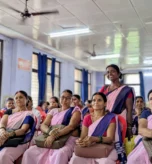Since I started my Gandhi Fellowship journey, I have come to realize that no one truly sees themselves as an adult. Let me explain why.
When I was ten years old, my elder brother was twenty. To me, he was a grown man, mature, responsible, and serious. Yet, when he was with his friends, he behaved playfully, indulging in childish antics. However, in front of me, he always maintained a composed and responsible demeanor, striving to be an ideal elder brother. As we grew older, the age gap remained the same, but the emotional distance between us gradually faded. I came to understand that neither he nor his friends truly saw themselves as “adults” in the way society expects.
This realization deepened when I began taking sessions in school. The students see me as their teacher, showing me respect and treating me as an authority figure. But deep down, I know I am just a young man who has been given this role. I want to talk to them as a friend, discuss everything openly, and break the barriers of hierarchy. However, society does not permit that.
The truth is, we are all just children who have grown into roles. We act mature when necessary, especially in front of those younger than us, but among our peers, we shed that mask. This is the great illusion the world lives in the belief that adulthood is a transformation rather than a performance we put on when required.
Perhaps this is why people often reminisce about childhood as the purest phase of life. Not because they had no responsibilities, but because they were free to be themselves without the burden of projecting an image. As we grow older, society conditions us to wear masks of seriousness, wisdom, and control hiding the fact that we are still figuring things out. The irony is, even the people we look up to, the so-called “real adults,” are just as lost, just as uncertain, and just as human as we are.



